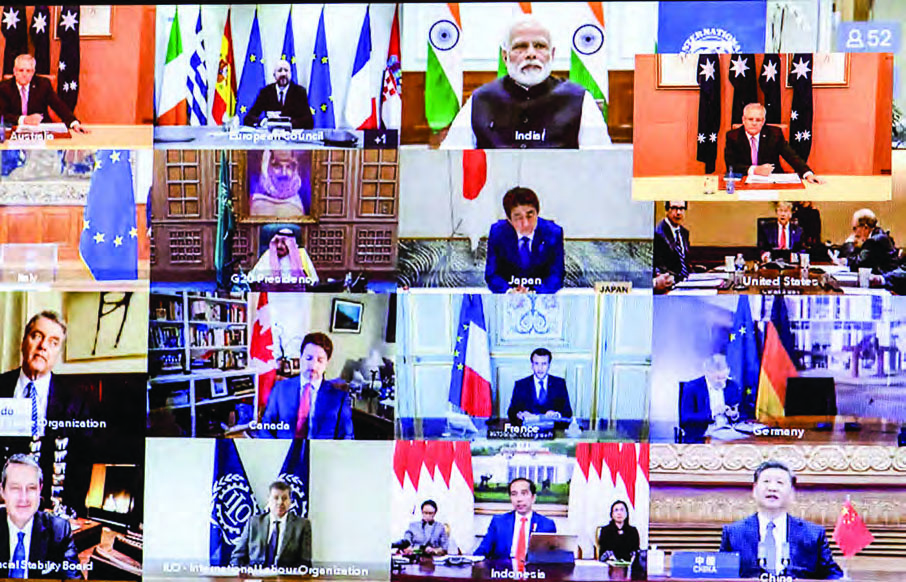CHINESE President Xi Jinping on 26 March urged G20 countries to remove trade barriers in an effort to spur a global recovery after the economic shock of the coronavirus pandemic.
“Xi urged G20 members to cut tariffs, remove barriers and facilitate the unfettered flow of trade” during his remarks at the emergency online summit, the official Xinhua news agency reported.
China has been hit hard by the Covid-19 outbreak since it emerged in the country late last year, with more than 80,000 infected and nearly 3,300 dead nationwide, according to official figures.
The world’s second-largest economy ground to a halt in February as authorities shut factories and imposed drastic lockdowns to curb the spread of the disease.
Economic growth had already slowed as a result of the long-running trade war with the United States that saw billions of dollars in tariffs slapped on trade between the two countries.
A main forum for international cooperation
Created in 1999, the G20 is a main forum for international cooperation on financial and economic issues. It comprises 19 countries plus the European Union. The countries are Argentina, Australia, Brazil, Canada, China, France, Germany, India, Indonesia, Italy, Japan, Mexico, Russia, Saudi Arabia, South Africa, South Korea, Turkey, Britain, and the United States.
The group, home to almost two-thirds of the world's population, accounts for about 86 per cent of the gross world product and 75 per cent of global trade.
Critical juncture
The world has now arrived at another critical juncture since the 2008 international financial crisis. Only this time is the health of both the global economy and humanity itself at stake.
To pull through this moment of twin crises — a raging coronavirus pandemic and a reeling global economy — requires purposeful guidance, as well as a swift and coordinated multilateral response.
Saudi Arabia, the chair of the Group of 20 (G20) major economies this year, staged an emergency virtual summit on Thursday.
The meeting could not come at a more appropriate time.
It will be the first time for the G20 leaders to hold a tele-summit since the mechanism, which had used to only gather finance ministers and central bankers, was elevated to be the world's premier platform for international economic cooperation in 2008 and helped the world ride out the worst global economic crash since the 1929 Great Depression.
Far more intractable
The situation is far more intractable this time. Ending the pandemic, which has led to shutdowns of factories and businesses in many parts of the world, and invigorating the global economy seem two contradictory missions.
So far, many governments have adopted measures to contain the disease and rescue their economies. However, the repeated stock market plunges indicate that they are not enough to calm investors' nerves and rebuild confidence.
At such a drastic moment, the G20 members, which account for around 90 per cent of the gross world product, 80 per cent of global trade and about two thirds of the entire human population, should once again step forward, join hands and champion a strong and well-organized collective global response.
To restore confidence
The most urgent task is to end the pandemic as soon as possible so as to restore confidence in the tumbling global markets.
The still spreading global pandemic is the very reason behind the panic and economic disruption.
The G20 members should come together in unity, share critical information and align their response efforts, so as to effectively arrest the virus' global spread.
One major problem exposed in the ongoing pandemic is a deficit in global public health governance, which resulted in a mainly country-based response so far when the crisis is beyond borders.
Common health of mankind
In the long run, a global architecture for the common health of mankind should be strengthened to better deal with future health emergencies and shore up confidence. To do that, the United Nations and the WHO should be given a core role.
Meanwhile, the world's top 20 major economies should join the International Monetary Fund and the World Bank to fight the slump in the global markets and drag the world economy back from the edge of another full-blown recession.
The good news is that the G20 has already set its action in motion. The G20 finance chiefs and central bankers agreed on Monday during their televised meeting to address the risks of debt vulnerabilities, develop a joint G20 Action Plan in response to COVID-19, and support financial stability and alleviate liquidity constraints for emerging markets and developing economies.
The bad news is that protectionism and isolationism are often on the rise when a crisis hits. The G20 members need to speak in one loud voice to reaffirm multilateralism and find a way to keep the world trade running when some restrictive measures have to be taken to contain the virus.
The pandemic should never be taken as an excuse to disassemble global supply chains, or run each country's economy wallto-wall.
Some 10 years ago, at the height of the international financial crisis, the G20 managed to salvage the global economy and showed that the human race is capable of addressing a crisis with solidarity.
This time the fight is even harder and the stakes much higher. The G20 should once again rally the confidence of countries around the world that as long as the international community works together in good faith, a total victory will be within reach.
Push for collaboration
With officials from the Group of 20 (G20) countries preparing for an emergency leaders' video summit, analysts said countries hit hard by COVID-19 should push for collaboration to address related economic and health problems.
As of 10:00 CET (0900 GMT) on Wednesday, a total of 414,179 cases of COVID-19 have been reported in 196 countries and territories, with more than 18,000 killed by the outbreak, according to the situation dashboard by the World Health Organization (WHO).
Raffaele Marchetti, a professor of international relations at LUISS University in Rome, told Xinhua the novel coronavirus has become "the biggest priority" on the G20's agenda.
The International Monetary Fund has forecast that the coronavirus pandemic is likely to spark a global recession, which prompted Saudi Arabia, this year's G20 chair, to call for the special summit to address the issue.
Antonio Villafranca, research coordinator and head of the European program at the Italian Institute for International Political Studies, said reflecting on the 2008-09 world financial crisis can provide a blueprint for G20 countries to address the economic implications of COVID-19.
"If the finance ministers and central bank governors can agree to coordinate action to help guarantee liquidity in financial markets and to take other steps to lessen the economic blow from the outbreak, then that will send a welcome signal to markets," Villafranca said.
G-20 to inject $5 trillion into the global economy
The Group of 20 leaders agreed Thursday to inject $5 trillion into the global economy to counteract the social and economic impact of the coronavirus pandemic.
In their joint statement released after an emergency video conference, the leaders supported the agreement earlier in the week between Japan and the International Olympic Committee to postpone this summer's Tokyo Games by one year.
REFERENCES Xinhua; Kyodo Updated News




